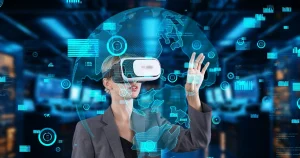The metaverse is being viewed by many industries as the next generation of the Internet. Its technological evolution will revolutionize business, and companies need to strategically embrace the metaverse now to prepare for future competition. Here we look at how the metaverse can be the foundation of your business, both in the short and long term.
The Future of Metaverse: Business Strategies for the Future

Short-term outlook (through 2025)
By 2025, the metaverse market is expected to expand rapidly, ushering in an era in which major companies will standardize the deployment of services within the metaverse. The following factors, among others, will drive the market during this period
1. Diffusion and evolution of VR/AR devices
One of the core technologies of the metaverse is virtual reality (VR) and augmented reality (AR) devices. The evolution and proliferation of these devices will further enrich the experience in the metaverse space and become an everyday tool for users.
- Lower device prices and improved performance: Although currently focused on a few advanced users and gamers, VR/AR devices are expected to come down in price and improve in performance over the next few years. This will allow more users to easily access the metaverse, and business activities and personal use will rapidly increase.
- Widespread use of virtual offices: With remote work becoming more common, demand for virtual offices and meeting space within the metaverse is increasing. Companies are expected to use the metaverse to provide a more realistic meeting experience and enable business communication beyond geographical constraints.
2. Metaverse expansion of major companies
Leading companies are already accelerating their entry into the metaverse market, and this is expected to become a standard business strategy by 2025. This will allow the metaverse to evolve from a mere entertainment and pilot technology to a major platform for corporate business activities.
- Service Deployment in the Metaverse: Many industries, including fashion, entertainment, education, and healthcare, are developing services that utilize the metaverse. For example, virtual fashion shows, virtual medical clinics, and online education offer new customer experiences by reimagining traditional services in virtual space.
- Establish brand presence: Many companies are opening stores and holding virtual events in virtual space to establish their brand presence in the metaverse. This is particularly appealing to the younger generation and can lead to increased brand awareness and new market acquisition.
- eCommerce Innovation: Unlike conventional e-commerce sites, the shopping experience within the metaverse is interactive, allowing customers to try on and try on products in a virtual space and view them in 3D. This greatly improves the immersive experience of online shopping and has the effect of motivating consumers to buy.
authority: Statista: Metaverse Market Growth Forecast
Statista reports that the metaverse market will be worth hundreds of billions of dollars by 2025, and many companies are aggressively entering this market. The market is expected to continue to grow, especially with the advancement of VR/AR technology.

Long-term outlook (2030 and beyond)
After 2030, the metaverse is expected to become the foundation of business in many industries, and new business models that transcend traditional physical constraints will take root. Specific long-term prospects are described below.
1. Metaverse Innovation in Manufacturing
In the manufacturing industry, efficient production, quality control, and remote monitoring will evolve by utilizing the metaverse, and new business models will emerge that transcend traditional physical constraints.
- Development of Digital Twin Technology: In the metaverse, "digital twin" technology plays an important role in the manufacturing industry. Digital twin is a technology that creates virtual copies of physical products and production processes for real-time simulation and monitoring. This enables equipment maintenance and optimization of production processes even from remote locations, thereby increasing efficiency and reducing costs.
- Development of virtual prototypes: In the manufacturing industry, virtual prototypes can be used in the early stages of product development to test designs and functions without physical prototyping. This significantly reduces development time and costs and enables faster time-to-market. This technology is especially useful for advanced industrial products such as automobiles and aircraft.
2. Metaverse Applications in the Financial Industry
The financial industry will also incorporate the metaverse as part of its business from 2030 onwards. Financial services in the metaverse using virtual currencies and blockchain technology will form a new financial ecosystem that goes beyond the existing financial system.
- Financial Transactions in the Metaverse: In-metaverse transactions using virtual currencies are already active and are expected to expand further in the future. Financial institutions will offer virtual banking and virtual asset management services in the metaverse, allowing users to complete all financial transactions in virtual space without having to visit a physical bank.
- New financial products utilizing NFTs: Within the metaverse, NFTs (non-substitutional tokens) play an important role as digital assets. New financial products and investment opportunities are being created to take advantage of this, especially in digital art and virtual real estate, etc. NFTs have the potential to enhance the credibility of asset transactions within the virtual space and play a central role in future economic activity.
3. Long-Term Impact of Metaverse in Education and Health Care
Metaverse will also bring revolutionary changes in the fields of education and healthcare. In particular, distance education and remote medical care will become more widespread, enabling service delivery beyond physical constraints.
- Distance Education Dissemination in the Metaverse: In the field of education, it is predicted that distance education using the metaverse will become commonplace after 2030. It will provide interactive classes within a virtual space and learning experiences through simulations that were not possible in the real world. For example, in training medical professionals, it is possible to learn skills safely and efficiently by simulating surgery in the metaverse.
- Evolution of Remote Medicine: In the medical field, remote medical care in virtual space will further evolve, and it will become more common for patients and doctors to see each other in the metaverse. This will allow patients in remote areas to receive advanced medical services and may eliminate regional disparities in medical care.

summary
In the short term, the metaverse will grow rapidly by 2025, and the proliferation of VR/AR devices and companies entering the metaverse will become the new standard for business. In the long term, after 2030, many industries will make the metaverse the foundation of their business, especially in the manufacturing and financial industries, where new business models will emerge that transcend physical constraints. It is imperative that companies strategically embrace the metaverse now to ensure their future competitive advantage.










